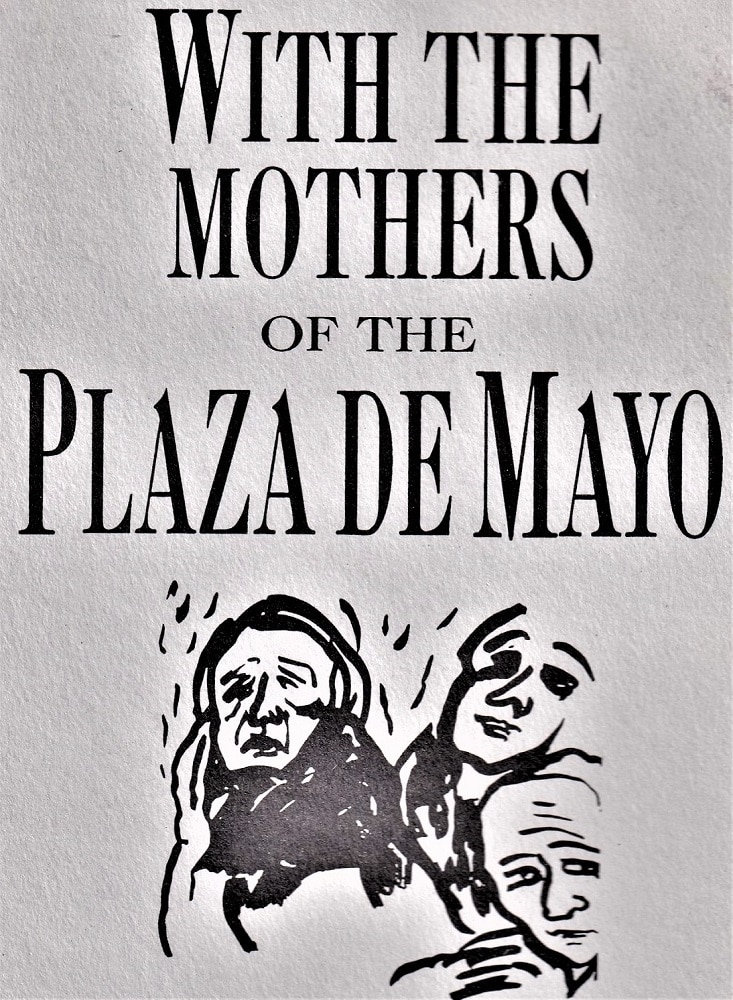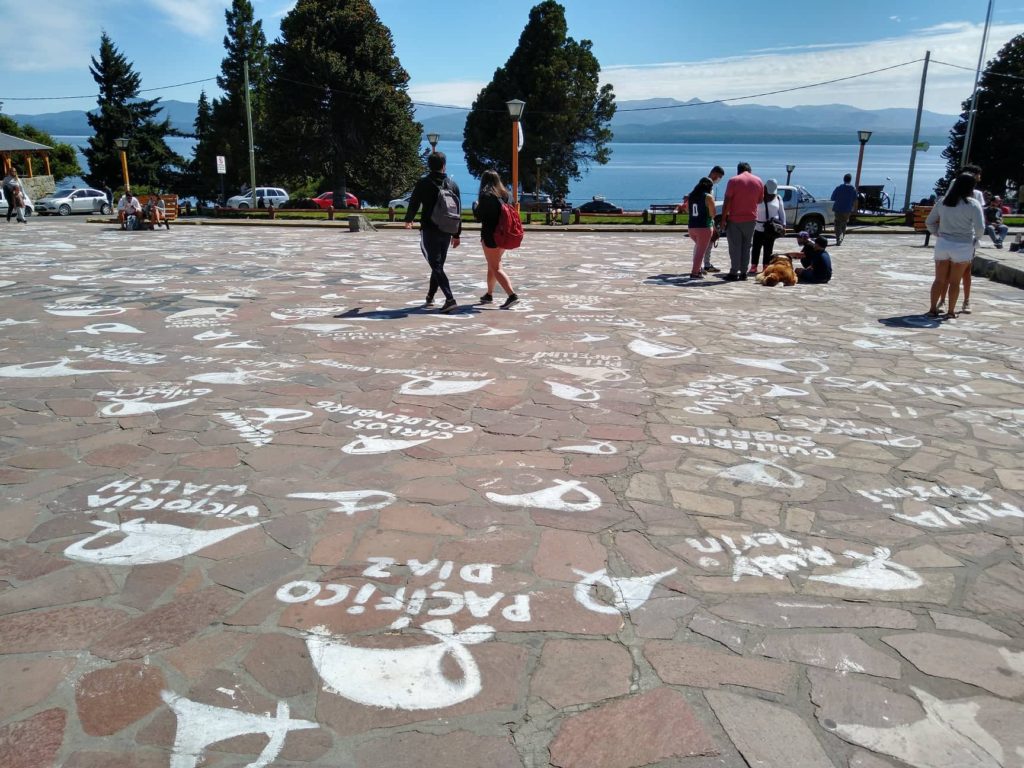
Marguerite Guzmán Bouvard, With the Mothers of the Plaza de Mayo (1st Edition) English & Spanish (Buy this book)
Review by Deb Ewing
Women’s voices are often minimized by patriarchal societies. Yet tradition relies on the mother to keep things together: food on the table, clothes mended, clandestine advice at the kitchen counter while washing dishes.
In Argentina 1977, it was the mothers who walked around the central monument at the Plaza de Mayo, and never stopped walking, because standing together in the streets would mean arrest. They demanded justice for their children – young outspoken activists, sometimes other family members – who were disappeared at the hands of Junta Militar. They refused payments offered by the government on behalf of allegedly deceased for whom there were no bodies. The Mothers were ridiculed publicly and threatened physically. Three of “Las Locas” were kidnapped and killed. Las Madres de la Plaza de Mayo are still active today, because civil unrest continues in Argentina. The Mothers haven’t forgotten.

Marguerite Guzmán Bouvard first visited the Mothers in 1989. She intended to research them for a book on women and human rights, but quickly realized that the Mothers were the book. “My response to them went deeper than that of scholar or human rights activist,” she wrote. “As a mother, I could feel their anguish in my own being and I developed a profound love for each one of them.”
Dr. Bouvard chronicles with careful lyricism a moment in time we could never revisit on our own. She speaks for every witness to the Mothers: the president’s secretary, the media, the torturers, the streets of Buenos Aires. She speaks for a mother’s dreams and the white scarf, for religion and education; for the seemingly absent fathers, and people on the bus who want to advise a young girl. She speaks on behalf of Argentina as an outsider who’s been let into its shaky heart.
“…Even the bodies deny their own facts:
– from Exhuming the Facts
the fingers have been cut off
to obliterate prints. You query
the human-rights lawyers, the foreign journalists,
the stunned families of the prisoners
who came to the Mothers for help.”
“Hasta los cuerpos niegan sus proprios
– de Exhumando Los Hechos
hechos: los dedos han sido cortados
para destruir las huellas digitales. Tú has interrogado
a los abogados de derechos humanos, los periodistas extranjeros,
las familias aturdidas de los presos
que vinieron a pedir ayuda a las Madres.
We still let ideology separate us from the Other for a false promise of security. We can’t claim we didn’t know; history calls us out. Torsten Dankert spells the truth of a city divided:
“In my childhood I grew up near the wall in East-Berlin. Near means half a mile from the border area. If I was going by bike, I had to be aware of the signs. ‘Don’t pass! Border zone’. But it was considered normal. As I grew older, the questions to that matter of fact would become more intensive. We had (and still have in that part of Berlin) relatives, and they could look and see us in East-Berlin. But for me it was impossible to look and see them. Later on you were told about the enemies behind the wall. But I knew my relatives and their stories about the ‘bad’ side of Berlin. And that made me disbelieving. So the wall has more and more become a mental problem than physical.”
Just recently, in a Nigerian plaza, protestors against police brutality refused to move when the police shot into the air. The police shot into the protestors. Twelve are reported dead. This is the world’s story.
America still refuses to see how bad things could really get, because we feel so big, so distant from one another across the continent. People cling to the belief that what they didn’t see for themselves doesn’t affect them.
Mark Pettibone was picked up off the street after protesting in Portland, Oregon, and video shows a woman being taken into a van in New York City, during protests around the death of George Floyd. What do we call 545 children who have been separated from their parents at the US/Mexico border? In another country, are they disappeared?
I get shivers every time I start to write this post. I, too, am shaken. If you let yourself be satisfied with these videos, you’re missing the rest of the story. Marguerite Guzmán Bouvard’s poems are a threnody that weaves through every culture on earth: we do not learn our lesson. We continue to let our children disappear. This book might, then, be a blueprint for how to conduct ourselves as the inevitable takes place around us.
The Mothers warn us to take alt-history and fake news as very real threats. They continue to march for over 40 years now, with canes and wheelchairs, and they know their watch will end soon.
“Among us there are mothers who escaped from the Nazi Holocaust, only to lose their Argentinian-born children to another dictatorship – so we know for a fact that these tragedies can repeat themselves.” – Haydée Gastelú to Uki Goñi of The Guardian
The mothers have not forgotten.
Listen to Joan Baró of Lauzeta Folk read En Argentina in Spanish:
Further exploration:
40 years later, the mothers of Argentina’s ‘disappeared’ refuse to be silent – The Guardian Forensic evidence has trickled in over the years, proving what the Mothers already knew: they were never crazy. Uki Goñi was in Buenos Aires for the Mothers’ tragic anniversary.
30,000 People Were ‘Disappeared’ in Argentina’s Dirty War. These Women Never Stopped Looking – The History Channel
Lauzeta Folk – Joan Baró and Nuria García are a dynamic, harmonic folk duo in Lleida, Catalunya, Spain. During the COVID-19 pandemic, they stream on Twitch every day and enjoin the audience in Garrotíns, a Catalunyan Flamenco tradition. Lauzeta’s fans write the verse with a 2/4 rhyming pattern, and Joan sings it live. Follow them on Facebook here.
Marguerite Guzmán Bouvard Dr. Guzmán is still active, too. Her nonfiction books are concerned with women and human rights.
¿Donde jugarán los Niños? – Maná If I could have my way, this song would be a soundtrack for the entire post.
545 Children – American songwriter Tom Prasado-Rao follows up his magnificent tribute $20 Bill with a testimony to children separated from their parents between 2017-2018, currently in the custody of US Border Patrol. He comments on the 2020 presidential election here.
Parents of 545 Children Separated at the US Border Still Can’t Be Found – I95Savannah.com According to this article, a court-appointed “steering committee” has reached out to parents of 1,035 children “previously released from government custody and almost all are likely in the United States with a sponsor.” Parents for 545 of the children cannot be located.
Federal Law Enforcement Use Unmarked Vehicles to Grab Protesters Off Portland Streets – Oregon Public Broadcasting Jonathan Levinson (OPB) and Conrad Wilson (OPB) interviewed Mark Pettibone on being picked up by alleged federal officers. No federal office will claim responsibility for the actions. The Mayor’s Office of Portland never asked for federal assistance.
HIJOS (in Spanish) – HIJOS is a recursive acronym for Sons and Daughters for Identity and Justice against Forgefulness and Silence. New HIJOS are constantly appearing thanks to DNA testing organized by the Grandmothers of the Plaza de Mayo
HIJOS Official Website (in English)
Visit Berlin Torsten and his lovely wife Ingrid look forward to the day when we can all come visit. So do I.
Special thanks to Mariana Moroni and Torsten Dankert for their assistance with this essay.

This is gnarles-bot, gnarly-tunes, brave and passionate. The videos alone, the resources, your sincerity. Thank you for writing this, sharing it, and breathing life into The Mothers, on our plane of awareness.